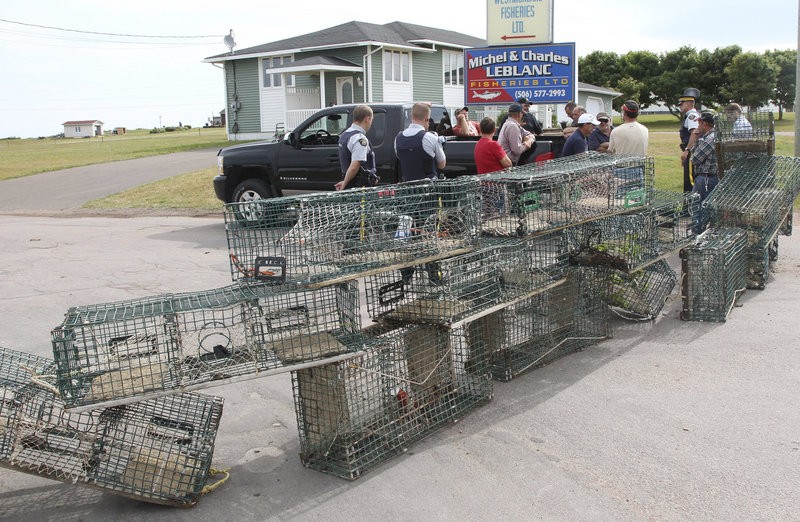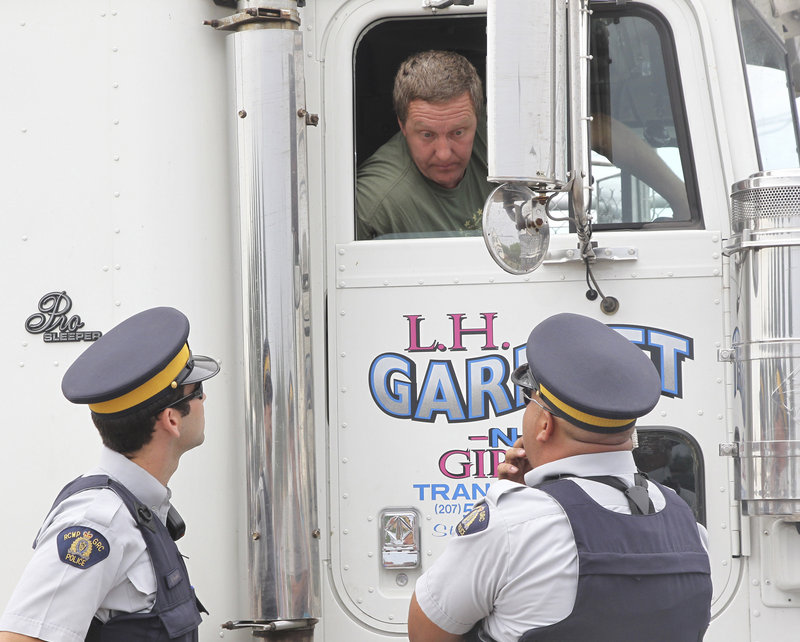Maine-caught lobster, whose abundance this summer has driven prices here to the lowest levels in a generation, has sparked angry protests among lobstermen in New Brunswick.
On Thursday morning, emergency tactical police teams responded to calls for help from two lobster processing companies in Cap-Pele, a small French-speaking town on the Northumberland Strait, 200 miles east of Calais.
The police encountered about 200 lobstermen and followed them as they moved from one plant to the other, demanding that the owners stop processing U.S. lobster, the CBC reported.
Both plants were reportedly closed, with workers sent home.
At midday, lobstermen in nearby Shediac spotted a tractor-trailer truck with Maine plates carrying a load of lobsters, according to the CBC, and blocked it in a driveway with the intention of leaving the lobsters to rot.
The blockades followed a meeting Wednesday night called by the Maritime Fishermen’s Union, at which 400 lobstermen commiserated about cheap soft-shell lobsters from Maine that are flooding local processing plants before the opening of their summer fishing season.
Reports say they expressed concern that Maine lobster — for which lobstermen are getting well under $3 a pound — will undermine demand and prices for locally caught lobster.
Christian Brun, the union’s executive secretary, said the meeting was called to inform members about what processors had been saying: that they probably won’t to be able to buy as much of the local catch as they usually do, and that prices will be low.
After the meeting, dozens of lobstermen drove to a processing plant in nearby Bedec, where they reportedly yelled at the plant owner, challenged his purchase of U.S. lobster and turned off refrigerators where lobsters were stored.
“We understand the frustration that harvesters are feeling. They are sandwiched between forces they can’t control,” Brun said, but protesting Maine lobster is misguided. “Aiming at shipments of lobster from the U.S. is just looking at the surface of the problem, in our point of view.”
John Sackton, publisher of Seafood.com, a Massachusetts-based news service covering the industry, said, “People in New Brunswick are fearful that the prices will be too low in this market, and Maine has become the poster boy for those concerns.”
He said, “If there was a way to control production — some way to land half as many lobsters this month — prices would take care of themselves, but it’s such a free-for-all fishery.”
Sackton suspects that the drop in prices was triggered partly by an especially good spring fishing season in eastern New Brunswick and Prince Edward Island, where the lobster fishery is closed in July and early August.
“Canadian processors already had a lot of lobster in their inventory (in June), and prices were already weak before the Maine season really got under way,” he said.
Sackton said he thinks that Canadian processors initially avoided buying Maine soft-shell lobsters, which can be too weak to survive long-distance shipping so must be sold locally or exported to Canada to be processed into lobster tails, frozen picked meat and other products.
That further depressed prices.
When Maine lobstermen started having a bumper harvest in July, prices got so low that the processors decided to act after all, filling their facilities.
“There are lots of theories about what is going on, and obviously it’s a weak market,” said Patrice McCarron, executive director of the Maine Lobstermen’s Association.
McCarron said there is no hard data yet to indicate how large July’s catch was.
Brun said the relationship with Maine has many advantages for the communities in his part of New Brunswick. Foremost among them is the ability to keep processing plants open eight to 10 months of the year, in a region where lobster is really caught for only four months.
“The harvesters are also able, of course, to sell their lobster to the U.S.,” he said. “That’s a give-and-take that we have to recognize.”
On Prince Edward Island, which faces Shediac and Cap-Pele across the Northumberland Strait, there were no indications of protests in the works, said Ian MacPherson, executive director of the P.E.I. Fishermen’s Association in Charlottetown.
MacPherson is cautioning his members against acting on rumors about processors’ buying intentions for the fishing season that starts next week.
“Rumors and rumors, and that’s how we’re treating them,” he said. “In these situations, we want to stay away from pointing the blame at one country or whatever.”
He said the real problem for lobstermen everywhere is that they have no control over the prices they’re paid for their product.
“As business people, we need to sit down and say, ‘Well, maybe what worked 80 years ago is dysfunctional today,’” he said. “Processors have to make a dollar, but you know what, harvesters do, too. That’s true if you live in Maine or in New Brunswick or in PEI.”
Staff Writer Colin Woodard can be contacted at 791-6317 or at:
cwoodard@mainetoday.com
Send questions/comments to the editors.




Comments are no longer available on this story